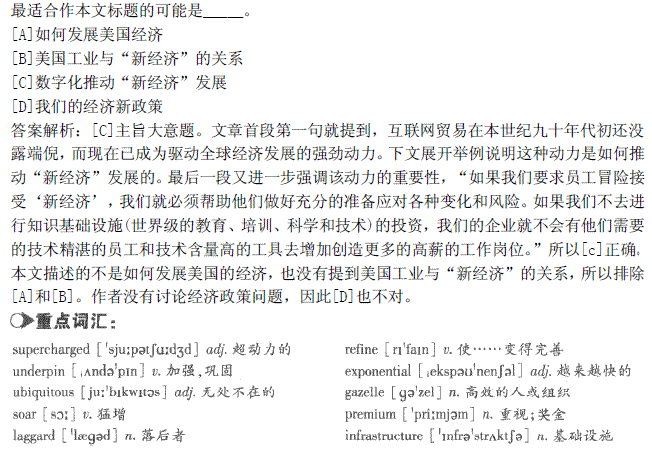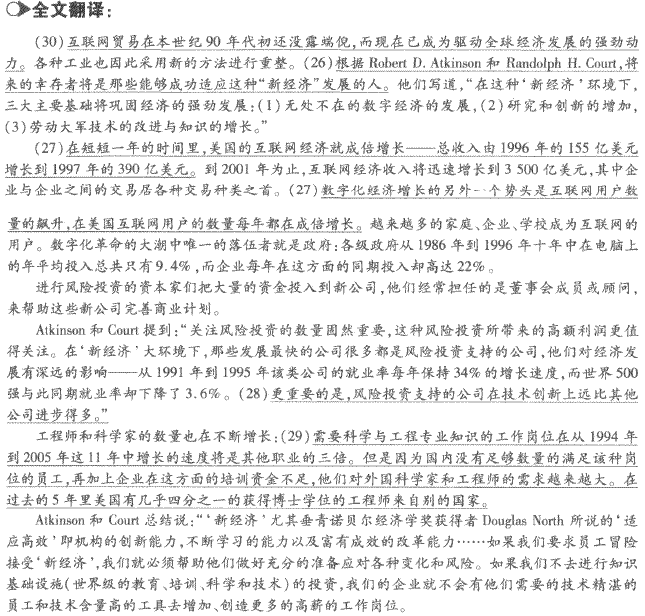Text 4 The EU's faltering progress towards a common system of taxing the huge revenues of the new digital giants lurched forward this morning as Margrethe Vestager,the EU commissioner in charge of competition,declared that Amazon had received unfair state
题目
Concerning tax problem,most of the EU countries'attitude toward tech giants is______
B.critical
C.supportive
D.ambiguous
相似问题和答案
第1题:
To solve the euro problem ,Germany proposed that______.
A.EU funds for poor regions be increased
B.stricter regulations be imposed
C.only core members be involved in economic co-ordination
D.voting rights of the EU members be guaranteed
解析:细节题。题干中的Germany定位在第四段,第一句是该段的概括提出应该强化法规。第二句these指代的第一句中的rules。第三句的主语it指代的Germany。因此第四段都提到了Germany,没有明确定位在某句话上。因此需要选项回原文一一对应。
第2题:
What is the ultimate goal that digital tax legislation should pursue?
B.Simplified corporate tax systems
C.A global cooperative approach
D.An anti-tax avoidance package
第3题:
能用于IP的是
A.BaFBr:Eu2+
B.Na2S2O3·5H2O
C.Na2CO3
D.CH3COOH
E.a-Se
含5个结晶水的硫代硫酸钠是
A.BaFBr:Eu2+
B.Na2S2O3·5H2O
C.Na2CO3
D.CH3COOH
E.a-Se
DR探测器可用的是
A.BaFBr:Eu2+
B.Na2S2O3·5H2O
C.Na2CO3
D.CH3COOH
E.a-Se
作为显示中和剂的是
A.BaFBr:Eu2+
B.Na2S2O3·5H2O
C.Na2CO3
D.CH3COOH
E.a-Se
显影液使用的是
A.BaFBr:Eu2+
B.Na2S2O3·5H2O
C.Na2CO3
D.CH3COOH
E.a-Se
请帮忙给出每个问题的正确答案和分析,谢谢!
问题 2 答案解析:B
问题 3 答案解析:E
问题 4 答案解析:D?
问题 5 答案解析:C
第4题:
The author believes ihat the commission's tax plan would
B.benefit some financial services
C.help curb monopoly power
D.force privacy rules to be modified.
第5题:
The author's attiiude toward EU's new tax plan is one of
B.strong disapproval.
C.reserved consent.
D.enthusiastic support.
第6题:
A suitable title for this text might be( )
[A] How to Develop U.S. Economy
[B] The Relation between American Industry and New Economy
[C]Digital Engine Powers New Economy
[D] Our New Policy on Economy


第7题:
To which of the following would EU officials most probably agree?
B.The pace of global corporate tax reform is too slow.
C.Europe should reduce the number of Iow-tax jurisdictions.
D.Corporate tax code is being revised in favor of the U,S.
第8题:
The debate over the EU's single currency is stuck because the dominant powers______.
A.are competing for the leading position
B.are busy handling their own crises
C.fail to reach an agreement on harmonization
D.disagree on the steps towards disintegration
解析:细节题。题干中The debate over the EU's single currency is stuck定位在第三段第一句,第二句的it is stuck是对第一句内容的重复,并且出现了because,因此答案指向because后面的内容。
第9题:
According to the first two paragraphs,the EU digital tax proposal
B.aims to updaic esiablished international practice.
C.is a blow to top digital companies.
D.binds only America's tech giants.
第10题:
The U.S.'s close attention to EU's tax plan making is mentioned to stress_____
B.Google and Amazon's success outside the U.S.
C.U.S.'s jealousy in European progress in tax reform
D.the universality of digital economy taxation problem
